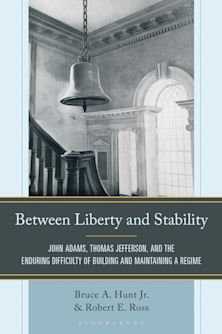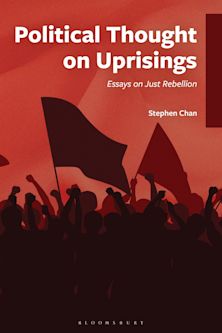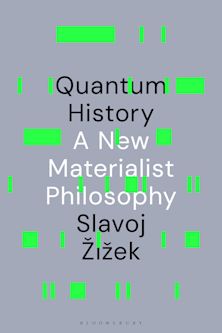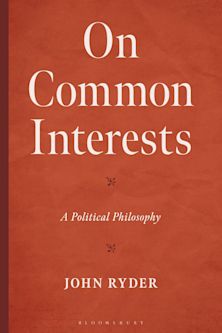- Home
- ACADEMIC
- Politics & International Relations
- Political Theory and Philosophy
- The Odyssey of Political Theory
This product is usually dispatched within 2-4 weeks
- Delivery and returns info
-
Flat rate of $10.00 for shipping anywhere in Australia
You must sign in to add this item to your wishlist. Please sign in or create an account
Description
This path-breaking and eloquent analysis of The Odyssey, and the way it has been interpreted by political philosophers throughout the centuries, has dramatic implications for the current state of political thought. This important book offers readers original insights into The Odyssey and it provides a new understanding of the classic works of Plato, Rousseau, Vico, Horkheimer, and Adorno. Through his analysis Patrick J. Deneen requires readers to rethink the issues that are truly at the heart of our contemporary "Culture Wars," and he encourages us to reassess our assumptions about the Western canon's virtues or viciousness. Deneen's penetrating exploration of Odysseus's and our own enduring battles between the dual temptations of homecoming and exploration, patriotism and cosmopolitanism, and relativism and universality provides an original perspective on contentious debates at the center of modern political theory and philosophy.
Table of Contents
Chapter 2 Odysseus's Choice
Chapter 3 Resolving the Ancient Quarrel Between Poetry and Philosophy: Plato's Odyssey
Chapter 4 The Harrowing of Rousseau's Emile
Chapter 5 Escaping the Dialectic: Vico, The Frankfurt School and the Dialectic of Enlightenment
Chapter 6 Against Cosmoploitanism: Resisting the Siren's Song
Product details
| Published | 14 Apr 2003 |
|---|---|
| Format | Paperback |
| Edition | 1st |
| Extent | 288 |
| ISBN | 9780847696239 |
| Imprint | Rowman & Littlefield |
| Dimensions | 230 x 152 mm |
| Publisher | Bloomsbury Publishing |
About the contributors
Reviews
-
Deneen brings political philosophy to bear on academic controversy in a manner that elevates the discussion. A must for all interested in higher learning and its blessings as well as its pitfalls. Highly recommended for graduate students, scholars, and teachers.
Choice Reviews
-
This is a book of quiet brilliance. In Deneen's well-woven tale, the afterlife of Odysseus in the classics of political theory becomes an avenue into the heart of contemporary debate about our deepest roots and our highest aspirations. When all is said and done, one of the most compelling voices in this debate turns out to be Deneen's. Like the Homeric original, his is an odyssey that moves inward, toward self-knowledge.
Jacob Howland, University of Tulsa
-
After Deneen's account it will be hard ever to return to viewing The Odyssey as apolitical. For the classical world, Deneen reveals why Plato's Socrates replaced the warrior Achilles with the founder Odysseus-an epochal transformation. For today's world, Deneen's Odyssey speaks tellingly to major tensions between self and community, particularity and universality, place and peregrination, the mastery of and integration with nature. All this in a book at once serious and engrossing.
Norma Thompson
-
Patrick Deneen wonderfully uses the figure of Odysseus-as he appears in Plato, Rousseau, Adorno, and Horkheimer, as well as in Homer-to trace a middle course between the stridencies of (some) postmodern multiculturalists and (some) defenders of the supposed absolute verities of the canon. It is an enlightening and an enlightened odyssey through and in political theory and a journey well worth taking with him.
Tracy B. Strong, Professor of Political Thought and Philosophy, University of Southampton
-
The Odyssey of Political Theory is based on a powerful idea, which, once articulated, seems so obvious that one wonders that the book was only just written. The tradition of the West begins with Homer, in whose Odysseus the human problem at the heart of poltical theory is embodied. For Patrick Deneen understanding Odysseus means understanding a cluster of dualisms: politics vs. philosophy, particular vs. universal, poetry vs. philosophy, myth vs. enlightenment, convention vs. nature. For this reason, understanding Odysseus has preoccupied thinkers as various as Plato, Rousseau, Vico, Adorno, and Horkheimer. By way of Odysseus, The Odyssey of Political Theory inquires at once into the essence of poltical theory and into the history of how that essence has been understood; it is an intelligent, elegantly written, and yet altogether unpretentious book.
Michael Davis, Sarah Lawrence College
-
This elegant study subtly unpacks for us the astonishing richness of Homer's Odyssey, reminding us that the great books are great precisely because they never cease to cast new light on the mysteries of human existence. Deneen shows us why the tale of Odysseus the polytropos has had such inexhaustible fascination for a steady stream of interpreters, from Plato to Adorno-and why it has fresh urgency for us today.
Wilfred M. McClay, University of Oklahoma



































